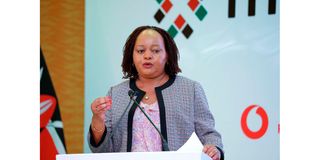Waiguru: How colleague saved me and my unborn baby

Council of Governors chairperson Anne Waiguru during the launch of M-Mama at Serena Hotel, Nairobi, on June 21, 2023. M-Mama is an emergency transport service to improve maternal health.
What you need to know:
- The Kirinyaga governor was speaking during the launch of a new programme that offers emergency transport for pregnant women in Kenya.
- M-mama uses mobile technology to link emergency referral systems, and transport expectant mothers facing complications to health facilities.
Council of Governor chairperson Anne Waiguru has revealed how a former workmate saved her life when she was heavily pregnant with her third-born son.
The Kirinyaga governor narrated how she and her unborn child almost died when she felt unwell at work.
“I, all of a sudden, felt unwell. I was then expecting my third child. It was my colleague who rushed me to hospital. When we reached there, doctors told me that if we had taken longer than an hour, we could have lost our lives,” said Ms Waiguru.
M-mama
She was speaking during the launch of a new emergency transport service for pregnant women in Kenya. M-mama, an initiative by the national government, USAID, Vodafone and M-Pesa Foundation, uses innovative mobile technology to link emergency referral systems, and transport pregnant women facing complications to health facilities.
Ms Waiguru said the quick intervention by her friend helped them survive even though her son was born two months earlier. “Those who know me are aware that my son is very close to me. He was born a premature baby but survived because of the urgent medical attention that we got. This is why this initiative is very close to my heart.”
Also read: More is needed on mother and newborn health
She said the county governments would continue being critical drivers of good health, describing the results of the recently released Kenya Demographic and Health Survey 2022 as evidence that Kenya has made remarkable improvements in health.
“Today, nine in every 10 mothers give birth under the care of trained healthcare workers, up from 66 per cent in 2014. The under-five mortality rate has reduced from 52 deaths per 1,000 to 41 deaths per 1,000, and the infant mortality rate from 39 to 32 deaths per 1, 000.”
Through m-mama, a clinically trained dispatcher manages referrals and confirms facility availability to ensure expectant mothers in emergency situations are promptly tended. The initiative will recruit and train local car owners to provide emergency transport when ambulances are unavailable, facilitating transport for patients. The service will be accessible through a toll-free number and drivers will be reimbursed instantly using M-Pesa.
Funding
The partners are parting with $18 million (Sh2.5 billion) in one-time setup costs to implement m-mama. So far, $14 million has been fully committed, with USAID providing $5 million (Sh650 million) and Vodafone and M-Pesa Foundation $9 million (Sh1.1 billion).
Health Cabinet Secretary Susan Nakhumicha said mothers should not at any stage fail to access quality healthcare services. She said safe pregnancy, delivery and post-delivery period is key to the attainment of Universal Health Coverage.
“As government, we are committed to ensuring that women enjoy their reproductive life, including safe motherhood as envisioned by the International Conference on Population and Development (ICPD25). We must promote women's reproductive health and rights and not preside over women and children dying from preventable maternal and perinatal causes,” said Ms Nakhumicha.
The CS said women should make decisions about their reproductive life, including when and whom to have children with, in a safe environment. The rate of maternal and neonatal mortality and morbidity from preventable causes around pregnancy, labour, delivery and postnatal period is still high in Kenya.
Currently, about 6,000 women and 35,000 newborns die annually from complications during birth. One of the challenges is lack of timely referrals and transport for women and their newborns to reach facilities that can provide quality services without unnecessary delays.
Ms Nakhumicha said the m-mama programme is aligned to Kenya’s Development and Health agenda and will strengthen primary healthcare and the use of digital platforms. She added the project will catalyse health sector partnerships for safe motherhood, hence accelerating the achievement of many maternal and perinatal targets.





